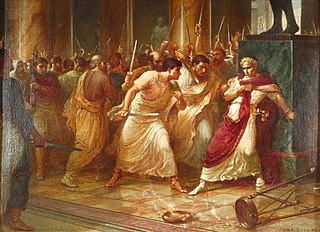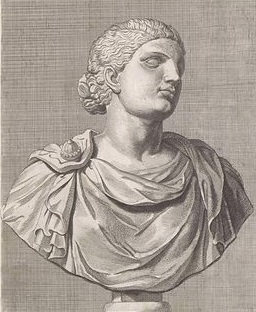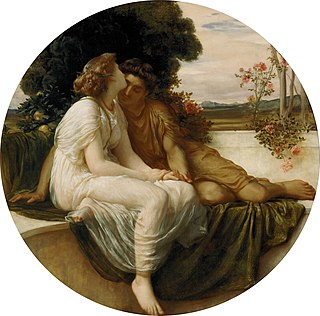Related Research Articles

Gaius Valerius Catullus, known as Catullus, was a Latin neoteric poet of the late Roman Republic. His surviving works remain widely read due to their popularity as teaching tools and because of their personal or sexually explicit themes.

The 1st century BC, also known as the last century BC and the last century BCE, started on the first day of 100 BC and ended on the last day of 1 BC. The AD/BC notation does not use a year zero; however, astronomical year numbering does use a zero, as well as a minus sign, so "2 BC" is equal to "year –1". 1st century AD follows.
80s BC is the time period from 89 BC – 80 BC.
Lucius Cornelius Cinna was a four-time consul of the Roman republic. Opposing Sulla's march on Rome in 88 BC, he was elected to the consulship of 87 BC, during which he engaged in an armed conflict – the Bellum Octavianum – with his co-consul, Gnaeus Octavius. Emerging victorious, Cinna initiated with his ally, Gaius Marius, extrajudicial killings of their personal enemies. In the aftermath, he dominated the republic for the next three years, serving continuously as consul.
Quintus Lutatius Catulus was a consul of the Roman Republic in 102 BC. His consular colleague was Gaius Marius. During their consulship the Cimbri and Teutones marched south again and threatened the Republic. While Marius marched against the Teutones in Gaul, Catulus had to keep the Cimbri from invading Italy. In this he failed; the Cimbri succeeded in invading the Po Valley. In 101 BC Catulus, as proconsul, continued the war against the Cimbri. Marius, elected consul for the fifth time, joined him and together they campaigned against the Germanic invaders in the Po Valley. At the Battle of Vercellae Marius and Catulus decisively defeated the Cimbri and ended the Germanic invasion. After Vercellae the two feuded, and Catulus consequently committed suicide following Marius's victory in the civil war of 87 BC.
Gaius Memmius was a Roman politician, orator and poet. He is most famous as the dedicatee of Lucretius' De Rerum Natura, and for his appearances in the poetry of Catullus.

Lucius Cornelius Sulla Felix, commonly known as Sulla, was a Roman general and statesman. He won the first large-scale civil war in Roman history and became the first man of the Republic to seize power through force.
Parthenius of Nicaea or Myrlea in Bithynia was a Greek grammarian and poet. According to the Suda, he was the son of Heraclides and Eudora, or according to Hermippus of Berytus, his mother's name was Tetha. He was taken prisoner by Helvius Cinna in the Mithridatic Wars and carried to Rome in 66 BC. He subsequently visited Neapolis, where he taught Greek to Virgil, according to Macrobius. Parthenius is said to have lived until the accession of Tiberius in 14 AD.

Et tu, Brute? is a Latin phrase literally meaning "and you, Brutus?" or "also you, Brutus?", often translated as "You as well, Brutus?", "You too, Brutus?", or "Even you, Brutus?". The quote appears in Act 3 Scene 1 of William Shakespeare's play Julius Caesar, where it is spoken by the Roman dictator Julius Caesar, at the moment of his assassination, to his friend Marcus Junius Brutus, upon recognizing him as one of the assassins. The first known occurrences of the phrase are said to be in two earlier Elizabethan plays; Henry VI, Part 3 by Shakespeare, and an even earlier play, Caesar Interfectus, by Richard Edes. The phrase is often used apart from the plays to signify an unexpected betrayal by a friend.

Aurelia was the mother of the Roman general and statesman Julius Caesar.

Calpurnia was either the third or fourth wife of Julius Caesar, and the one to whom he was married at the time of his assassination. According to contemporary sources, she was a good and faithful wife, in spite of her husband's infidelity; and, forewarned of the attempt on his life, she endeavored in vain to prevent his murder.

Cornelia was the first or second wife of Julius Caesar, and the mother of his only legitimate child, Julia. A daughter of Lucius Cornelius Cinna, Cornelia was related by birth or marriage to many of the most influential figures of the late Republic.

The poetry of Gaius Valerius Catullus was written towards the end of the Roman Republic in the period between 62 and 54 BC.
Lucius Cornelius Cinna was a politician in the Roman Republic. He came from a noble family which had gained prominence during the civil wars of the 80s BC, but lost their political rights for opposing the dictator Sulla. Cinna sought better fortune for himself by joining the failed rebellions of Lepidus and Sertorius in the 70s BC, but was recalled to Rome and granted amnesty with the support of his brother-in-law, Julius Caesar. Cinna remained debarred from public office, however, an impediment only rescinded by Caesar when he crossed the Rubicon and took control of Rome in 49 BC.

Julius Caesar was assassinated by a group of senators on the Ides of March of 44 BC during a meeting of the Senate at the Curia of Pompey of the Theatre of Pompey in Rome where the senators stabbed Caesar 23 times. They claimed to be acting over fears that Caesar's unprecedented concentration of power during his dictatorship was undermining the Roman Republic. At least 60 to 70 senators were party to the conspiracy, led by Marcus Junius Brutus, Gaius Cassius Longinus, and Decimus Junius Brutus Albinus. Despite the death of Caesar, the conspirators were unable to restore the institutions of the Republic. The ramifications of the assassination led to his martyrdom, the Liberators' civil war and ultimately to the Principate period of the Roman Empire.
Cinna may refer to:
The career of Julius Caesar before his consulship in 59 BC was characterized by military adventurism and political persecution. Julius Caesar was born on 12 July 100 BC into a patrician family, the gens Julia, which claimed descent from Iulus, son of the legendary Trojan prince Aeneas, supposedly the son of the goddess Venus. His father died when he was just 16, leaving Caesar as the head of the household. His family status put him at odds with the Dictator Lucius Cornelius Sulla, who almost had him executed.
The gens Epidia was an obscure plebeian family at ancient Rome. The only members to achieve any importance lived during the first century BC.
The gens Grania was a plebeian family at ancient Rome. Although none of them ever obtained the consulship, the family was of "senatorial rank", and was well known from the latter half of the second century BC. In Imperial times, a number of them became distinguished in military and provincial service.
The gens Helvia was a plebeian family at ancient Rome. This gens is first mentioned at the time of the Second Punic War, but the only member of the family to hold any curule magistracy under the Republic was Gaius Helvius, praetor in BC 198. Soon afterward, the family slipped into obscurity, from which it was redeemed by the emperor Pertinax, nearly four centuries later.
References
- Weichert, J A: Poetarum Latinorum Vitae (1830)
- Lucian Müller's edition of Catullus (1870), where the remains of Cinna's poems are printed
- Kiessling, A: De C. Helvio Cinna Poeta in Commentationes Philologicae in honorem T. Mommsen (1878)
- Otto Ribbeck, Geschichte der romischen Dichtung, i. (1887)
- Plessis, Frédéric: La poésie latine de Livius Andronicus à Rutilius Namatianus (1909)
- Wiseman, T P:
- Catullan Questions (Leicester University Press, 1969)
- Cinna the Poet and other Roman Essays (Leicester University Press, 1974), especially ch.2 (pp. 44–58) "Cinna the Poet".
- J. L. Lightfoot, Parthenius of Nicaea (Clarendon Press, Oxford, 1999)
- This article incorporates text from a publication now in the public domain: Chisholm, Hugh, ed. (1911). "Cinna, Gaius Helvius". Encyclopædia Britannica . Vol. 6 (11th ed.). Cambridge University Press. p. 375.